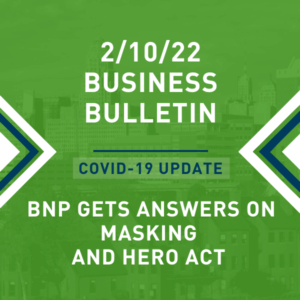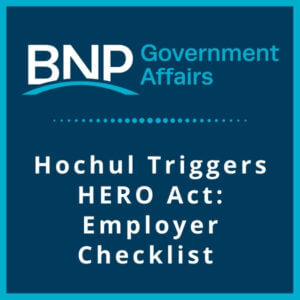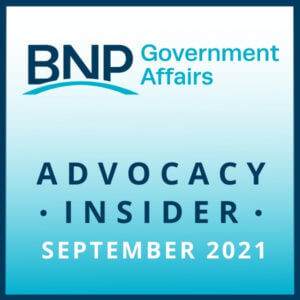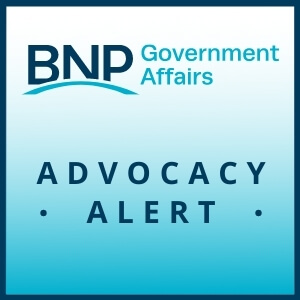What Employers Need to Know About the HERO Act
Blog Categories
May 24, 2021
Recently, Governor Cuomo signed the NY HERO Act, a bill that creates new workplace safety requirements. This legislation will have wide-ranging implications for employers across the state. The BNP strongly advocated for changes to make this legislation less burdensome. Now that it has become law, it is important for employers to understand how the HERO Act will impact them.

What Does it Do?
- Airborne Infectious Disease Exposure Prevention Standards. The bill requires the state Departments of Labor and Health to develop new workplace disease prevention standards, governing:
- health screening
- masks and PPE
- handwashing
- surface disinfecting
- social distancing
- quarantines and isolation
The state will publish industry-specific guidelines. Then, every employer is required to create a workplace safety plan by adopting the state model for their industry or by creating their own standard that meets the state’s minimum requirements. Employers will then be required to adhere to these plans at all times – even after the pandemic ends. Noncompliance will be costly: the state will fine employers $50/day for failure to adopt a safety plan. Employers who violate their safety plan can be liable for fines between $1,000-$10,000. This provision is expected to take effect July 4th.
- Workplace Safety Committees. The bill requires every workplace with 10+ employees to form a workplace safety committee. The committee must meet quarterly and be composed of employer and employee designees. These committees are tasked with raising health and safety concerns to their employer, to which employers. must respond. This requirement takes effect November 1st.
What action did BNP take?
The BNP was active in pushing back against this legislation after hearing concerns from numerous members. Throughout the pandemic, businesses have shown an ability to follow rapidly-changing public health guidelines and adjust their operations in real time, and the state’s own data has shown a very small amount of COVID-19 transmissions at workplaces. Instead of acknowledging businesses’ ability to protect employees, this bill adds duplicative and costly requirements onto them. The BNP remained in frequent contact with the Governor and legislative leaders to express concerns with this bill and to suggest improvements that would make it less burdensome without reducing protections for workers.
For what amendments did BNP advocate? Were those amendments included in the final agreement?
- Limit the infectious disease standards to declared states of emergency. BNP argued that doing so would protect workers in times of crisis, while reducing the burden on businesses when risk is low. This proposed amendment faced the most resistance and was not included in the final agreement.
- Eliminate private right of action. BNP argued that the private right of action would subject employers to significant liability and frivolous lawsuits. This provision was not fully removed in final agreement, but some important chapter amendments will improve it:
- Employers are no longer liable for liquidated damages
- Employees are required to notify employers of issues
- 30-day cure period in which employers can correct violations without penalty
- 6-month statute of limitations
- Courts can award employers for costs and attorney fees in frivolous lawsuits
- Eliminate workplace safety committees. BNP argued that the bill’s workplace safety committee structure is burdensome and costly, and there are better ways to include employee input. Although the enacted law still mandates these committees, the final agreement includes minor chapter amendments. Employers that already have existing workplace committees are exempt from this provision. The scope of policies the committee can review is much more narrow in the final agreement: the original bill would have allowed the committee to review any policy related to worker’s compensation law, but the agreement limits the committee’s scope to reviewing occupational safety policy.
The full HERO Act text can be found here, and the agreement’s chapter amendments here. As the state releases its standards as required under the Act, BNP will continue to communicate updates and helpful information.
Related Posts
9.9.21 COVID-19 Bulletin: Biden To Mandate “Vax or Test” Requirement for Large Employers
Yesterday, Governor Kathy Hochul announced she would repeal the state’s mask mandate, effective today. However, her announcement did not proactively address how the repeal coincided with the NY HERO Act, which would have required employees in most workplaces to continue masking.
9.7.21 Advocacy Alert: Hochul Triggers HERO Act – Employer Checklist
Yesterday, Governor Kathy Hochul designated COVID-19 as a “highly contagious communicable disease,” citing rising case numbers and concerns about the delta variant. This declaration is significant because it triggers the NY HERO Act.
BNP Advocacy Insider – September 2021
The September 2021 Advocacy Insider is a roundup of important issues we are monitoring that could you and your business.
9.2.21 Advocacy Alert: NYS Extends Eviction Moratorium
Last night, the New York State Legislature convened for a special session to extend the state’s eviction moratorium.
The moratorium, which prevents the eviction of tenants declaring financial hardship, will remain in place though January 15.
The move represents Gov. Kathy Hochul’s first legislative action. The bill passed 38-19 in the Senate and 80-60 in the Assembly.




